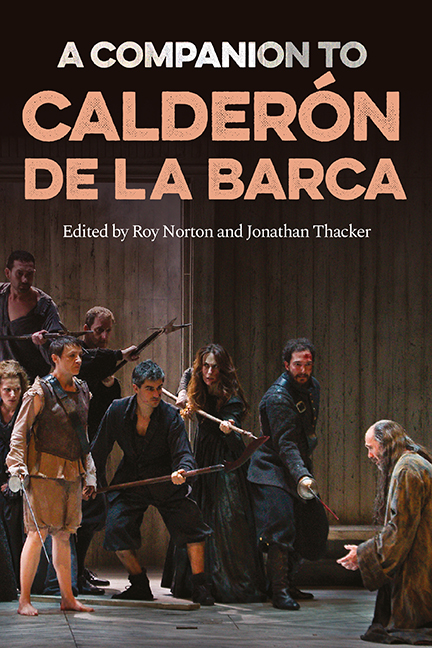Book contents
- Frontmatter
- Dedication
- Contents
- List of Illustrations
- List of Contributors
- Acknowledgements
- List of Abbreviations
- Introduction
- 1 Biography and Context
- 2 The Calderonian World
- 3 The Playwright’s Craft: Calderón and the Great Theatrical World of Early Modern Spain
- 4 La vida es sueño
- 5 The Honour Plays of Calderón
- 6 Calderón, the Comedian
- 7 Mythological Court Spectacle Plays
- 8 Religious comedias
- 9 Calderón’s ‘Sacramental, Allegorical and Historical’ autos
- 10 Calderón’s graciosos
- 11 Calderón and Visual Art
- 12 The Staging of Calderón’s Theatre
- 13 Calderón’s European Reception from Romanticism to the Twentieth Century
- 14 The Reception of Calderón in the Hispanic World
- Appendices
- Consolidated Bibliography
- Index
- Tamesis • Companions
10 - Calderón’s graciosos
Published online by Cambridge University Press: 07 October 2022
- Frontmatter
- Dedication
- Contents
- List of Illustrations
- List of Contributors
- Acknowledgements
- List of Abbreviations
- Introduction
- 1 Biography and Context
- 2 The Calderonian World
- 3 The Playwright’s Craft: Calderón and the Great Theatrical World of Early Modern Spain
- 4 La vida es sueño
- 5 The Honour Plays of Calderón
- 6 Calderón, the Comedian
- 7 Mythological Court Spectacle Plays
- 8 Religious comedias
- 9 Calderón’s ‘Sacramental, Allegorical and Historical’ autos
- 10 Calderón’s graciosos
- 11 Calderón and Visual Art
- 12 The Staging of Calderón’s Theatre
- 13 Calderón’s European Reception from Romanticism to the Twentieth Century
- 14 The Reception of Calderón in the Hispanic World
- Appendices
- Consolidated Bibliography
- Index
- Tamesis • Companions
Summary
The most conspicuous sign of the mixing of dramatic modes that defines the comedia nueva is the inclusion across all subgenres of the criado gracioso [comic servant], a character type present in the majority of Calderón's plays and an important contributor to their ideology and aesthetic. The gracioso appears uncontroversially in Calderón's comedias cómicas [comic plays], alongside other comic elements and nods to potentially sombre themes, but he is also a standard feature of the often tragically inclined comedias serias [serious plays], standing out in these as a prov-ocation to the period's classicising purists, who, in defiance of the dominant style, advocated a return to the strict separation of tragic and comic prescribed, as they saw it, by the ancients, especially Aristotle, their pique only heightened by the sway the often indecorous gracioso held over the socially and educationally diverse audiences that flocked to the theatres of Golden Age Spain.
Since, logically, the comic servant must occupy a lower position than his master in the social hierarchy, it is tempting to assume that his interventions were designed to please the humble mosqueteros [groundlings], who may well have sympa-thised most readily with certain of the gracioso's conventional traits, his proclivity for questioning the classist worldview of his master, for instance, or his perennial concern to secure a steady, plentiful food supply. But the gracioso evidently had broader appeal. The most celebrated actor of the age, Cosme Pérez (alias Juan Rana [John Frog]) was a short, fat, spindly legged man who made his name playing gracioso parts and he was a firm favourite in the royal household. He was so admired by Queen Mariana de Austria, no less, that in 1651 she rewarded him with a lifelong allowance from her household in recompense for ‘lo que la hace reír’ [making her laugh so much], and this in spite of the open secret of Pérez's homosexuality and his arrest for sodomy in 1636.
Likewise, graciosos could engage spectators possessing varied degrees of erudition. At one end of the spectrum stand Gil and Menga, the rustic gracioso pairing of La devoción de la cruz [Devotion to the Cross].
- Type
- Chapter
- Information
- A Companion to Calderón de la Barca , pp. 199 - 222Publisher: Boydell & BrewerPrint publication year: 2021



